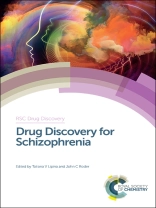Since the pioneering pharmacotherapy for treatment of schizophrenia in the 1950s by antipsychotics, only a few major innovations have been made, pointing to a general stagnation in the field of pharmacology of schizophrenia. Drug Discovery for Schizophrenia covers new insights in the field of schizophrenia with an aim to advance the understanding of scientists and clinicians in this area and to fuel drug discovery. The book outlines a change in the way schizophrenia is treated by moving away from focusing only on treating symptoms in patients. Innovative drugs emerge from deeper comprehension of the pathological processes that emerge earlier in life, hence, providing strategies for preventative therapy to alter the course of this mental disorder. Amongst other current topics, the book covers new findings in genetics and epigenetics, progress in animal models for schizophrenia and the usage of induced pluripotent stem cells. The combination of these important areas benefit psychiatric neuroscience, filling the gaps in the knowledge of neurobiology of schizophrenia and providing novel perspectives for future drug development.
Inhoudsopgave
Genetics of schizophrenia: Genome-Wide Association Study;
Epigenetics of schizophrenia;
Cognitive dysfunction in schizophrenia;
Modelling schizophrenia;
Glutamate hypothesis of schizophrenia;
Dopamine hypothesis of schizophrenia;
Neurodevelopmental hypothesis of schizophrenia;
Genetic factors and hippocampal dysfunction in schizophrenia;
Exome study of schizophrenia;
Protein-protein interactions as a potentially new drug target in schizophrenia;
Optogenetic approach to dissect neurobiology of schizophrenia;
Micro RNAs in neuronal function and dysfunction;
Application of pluripotent stem cells in schizophrenia;
Deep brain stimulation of the hippocampus and prefrontal cortex as alternative approach in treatment of schizophrenia;
Neuroimmunology of brain development in schizophrenia and immunotherapy












